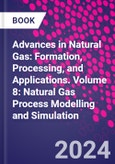Advances in Natural Gas: Formation, Processing, and Applications is a comprehensive eight-volume set of books that discusses in detail the theoretical basics and practical methods of various aspects of natural gas from exploration and extraction, to synthesizing, processing and purifying, producing valuable chemicals and energy. The volumes introduce transportation and storage challenges as well as hydrates formation, extraction, and prevention.
Volume 8 titled Natural Gas Process Modelling and Simulation discusses various aspects of natural gas related processes from modelling and simulation point of view. This includes modelling of natural gas sweetening, dehydration and other impurities removal processes and apparatus as well as simulation of processes and apparatus dealt with producing chemicals and energy from natural gas. The book introduces modelling and simulation of natural gas hydrate related processes and covers modelling basics, numerical approaches and optimization techniques, which provides a deeper understanding of the subject.
Please Note: This is an On Demand product, delivery may take up to 11 working days after payment has been received.
Table of Contents
Preface
Acknowledgments
About the Editors
Section 1. Modelling and Simulation of Natural Gas Sweetening Processes and Apparatus
1. Process modelling and simulation of natural gas sweetening by absorption processes
2. Modelling and simulation of natural gas sweetening by adsorption technologies: PSA, TSA, VSA, etc.
3. Modelling and simulation of natural gas sweetening using membranes
4. Modelling and simulation of CO2 removal from CO2-rich natural gas via supersonic separators
5. Case studies of modelling and simulation of natural gas sweetening processes
Section 2. Modelling and Simulation of Natural Gas Dehydration Processes and Apparatus
6. Process modelling and simulation of natural gas dehydration by absorption technology
7. Modelling and simulation of natural gas dehydration by adsorption technologies: PSA, TSA, VSA, etc.
8. Modelling and simulation of natural gas dehydration using membranes
9. Modelling and simulation of natural gas dehydration via supersonic separators
Section 3. Modelling and Simulation of Other Impurities Removal from Natural Gas
10. Modelling and simulation of hydrocarbon dew-point adjustment of natural gas via supersonic separators
11. Thermodynamic models and process simulation of mercury removal from natural gas
12. Process modelling and simulation of nitrogen separation from natural gas
Section 4. Modelling and Simulation of Chemicals and Energy Production Processes and Apparatus from Natural Gas
13. Modelling of Furnace and heat exchanger type reformers
14. Modelling and simulation of fixed-bed, fluidized-bed and autothermal reformers
15. Modelling and simulation of natural gas reforming by membrane
16. Modelling and simulation of cogeneration and trigeneration applications of natural gas
17. Modelling and simulation of sulfur recovery unit
18. CNG, LNG and ANG processes simulation and modelling
19. Gas to Liquid (GTL) Process Modeling and Simulation
Section 5. Modelling and Simulation of Natural Gas Hydrates Processes and Apparatus
20. Modelling and simulation of exploration and exploitation natural gas hydrate
21. Numerical modelling of natural gas hydrate formation
22. Modelling and simulation of natural gas hydrate stabilizers
23. Modelling and simulation of methane recovery from gas hydrate
Authors
Mohammad Reza Rahimpour Professor, Department of Chemical Engineering, Shiraz University, Shiraz, Iran.Prof. Mohammad Reza Rahimpour is a professor in Chemical Engineering at Shiraz University, Iran. He received his Ph.D. in Chemical Engineering from Shiraz University joint with University of Sydney, Australia 1988. He started his independent career as Assistant Professor in September 1998 at Shiraz University. Prof. M.R. Rahimpour, was a Research Associate at University of California, Davis from 2012 till 2017. During his stay in University of California, he developed different reaction networks and catalytic processes such as thermal and plasma reactors for upgrading of lignin bio-oil to biofuel with collaboration of UCDAVIS. He has been a Chair of Department of Chemical Engineering at Shiraz University from 2005 till 2009 and from 2015 till 2020. Prof. M.R. Rahimpour leads a research group in fuel processing technology focused on the catalytic conversion of fossil fuels such as natural gas, and renewable fuels such as bio-oils derived from lignin to valuable energy sources. He provides young distinguished scholars with perfect educational opportunities in both experimental methods and theoretical tools in developing countries to investigate in-depth research in the various field of chemical engineering including carbon capture, chemical looping, membrane separation, storage and utilization technologies, novel technologies for natural gas conversion and improving the energy efficiency in the production and use of natural gas industries.
Mohammad Amin Makarem Taylor's University, Malaysia.Dr. Mohammad Amin Makarem is a research associate at Taylor's University, Malaysia. He former worked at Shiraz University. His research interests are gas separation and purification, nanofluids, microfluidics, catalyst synthesis, reactor design and green energy. In gas separation, his focus is on experimental and theoretical investigation and optimization of pressure swing adsorption process, and in the gas purification field, he is working on novel technologies such as microchannels. Recently, he has investigated methods of synthesizing bio-template nanomaterials and catalysts. Besides, he has collaborated in writing and editing various books and book-chapters for famous publishers such as Elsevier, Springer and Wiley, as well as guest editing journals special issues.
Maryam Meshksar Research Associate, Department of Chemical Engineering, Shiraz University, Shiraz, Iran. Maryam Meshksar is a research associate at Shiraz University. Her research has focused on gas separation, clean energy, and catalyst synthesis. In gas separation, she is working on membrane separation process, and in the clean energy field, she has worked on different reforming-based processes for syngas production from methane experimentally. She has also synthesized novel catalysts for these processes which are tested in for the first time. Besides, she has reviewed novel technologies like microchannels for energy production. Recently, she has written various book-chapters for famous publishers such as Elsevier, Springer, and Wiley.







